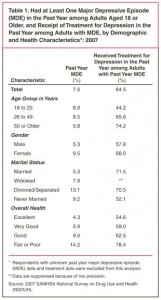![]() Depression is a public health problem that affects millions of adults every year. It affects persons in all demographic groups, although some groups are more likely to experience depression than others. There are different treatment options for depression, including various psychotherapeutic approaches and medications. Moreover, treatment services are offered through a variety of sources, such as primary care physicians and psychiatrists. Gaining a better understanding of the rates of depression and the patterns of service use can help policymakers and administrators ensure that services are available to individuals who need them, that disparities in treatment can be addressed, and that effective services are offered through venues that people are most likely to use.
Depression is a public health problem that affects millions of adults every year. It affects persons in all demographic groups, although some groups are more likely to experience depression than others. There are different treatment options for depression, including various psychotherapeutic approaches and medications. Moreover, treatment services are offered through a variety of sources, such as primary care physicians and psychiatrists. Gaining a better understanding of the rates of depression and the patterns of service use can help policymakers and administrators ensure that services are available to individuals who need them, that disparities in treatment can be addressed, and that effective services are offered through venues that people are most likely to use.
The National Survey on Drug Use and Health (NSDUH) includes questions about major depressive episode (MDE) and treatment for depression. MDE is defined using the diagnostic criteria in the 4th edition of the Diagnostic and Statistical Manual of Mental Disorders (DSM-IV), which specifies a period of 2 weeks or longer during which there is either depressed mood or loss of interest or pleasure and at least four other symptoms that reflect a change in functioning, including problems with sleep, eating, energy, concentration, and self-image. Treatment for depression is defined as seeing or talking to a medical doctor or other professional or using prescription medication in the past year for depression. This issue of The NSDUH Report examines MDE among adults aged 18 or older. All findings presented in this report are based on 2007 NSDUH data.
Prevalence of MDE

Table 1. Had at Least One Major Depressive Episode (MDE) in the Past Year among Adults Aged 18 or Older, and Receipt of Treatment for Depression in the Past Year among Adults with MDE, by Demographic and Health Characteristics*: 2007
Treatment for Depression

Figure 1. Type of Treatment Received for Depression in the Past Year among Adults Who Experienced Past Year Major Depressive Episode (MDE) and Received Treatment for Depression in the Past Year* , **: 2007
Type of Treatment for Depression

Figure 2. Type of Professional Seen among Adults with Past Year Major Depressive Episode (MDE) Who Saw or Talked to a Medical Doctor or Other Professional about Depression in the Past Year* , **: 2007
Among those adults who saw or talked to a medical doctor or other health professional about depression, over three fifths (61.9 percent) saw or talked to a general practitioner or family doctor (Figure 2). Also, 29.1 percent saw or talked to a psychiatrist or psychotherapist. A similar percentage (28.5 percent) saw or talked to a psychologist.
Discussion
About 1 in 13 Americans aged 18 or older experienced MDE in the past year, with particular subgroups—such as divorced or separated adults—having rates as high as 1 in 8. Despite the effectiveness of mental health treatment and a variety of available treatment options, one third of adults who experienced past year MDE did not receive treatment for depression in the past year. Rates of treatment use were particularly low among young adults aged 18 to 25, with less than half who had past year MDE receiving treatment for depression. Among adults who received treatment from a medical doctor or other health professional, over three fifths saw a general practitioner or family doctor. Because most adults with MDE consult or receive care from a family doctor, it is essential that general practitioners are kept up to date on the latest findings on screening and treatment for depression.
Material adapted from The NSDUH Report by CFisher
*Information to determine how these individuals could have taken prescription medication without seeing a medical doctor or other health professional was not collected. This group may include persons who last saw or spoke to a doctor or other professional about depression more than a year ago yet took prescription medication for MDE during the past year.
Reference:
Substance Abuse and Mental Health Services Administration, Office of Applied Studies. (May 14, 2009). The NSDUH Report: Major Depressive Episode and Treatment among Adults. Rockville, MD.
No comments yet.